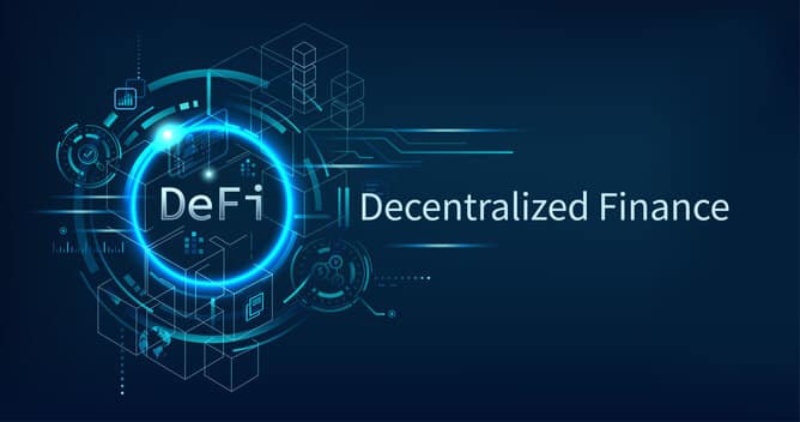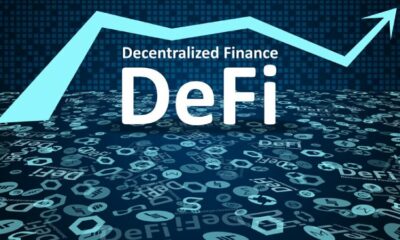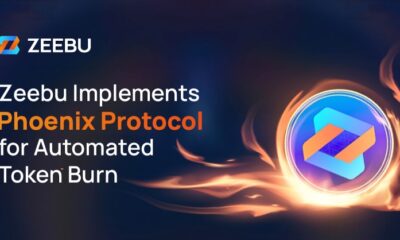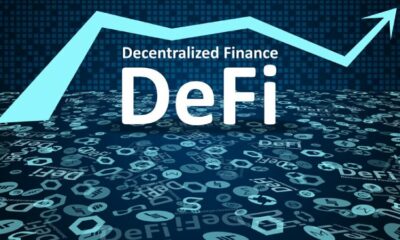Startup
What is a DeFi Company? How to Start a Decentralized Finance Company?

Decentralized Finance (DeFi) presents a decentralized and transparent substitute for conventional banking and financial services, making it a disruptive force in the financial sector. This thorough guide will take you through all the necessary steps to successfully launch your own DeFi company if you’re thinking about getting into the fascinating and fast-paced world of DeFi.
What is a DeFi company?
An organization that uses blockchain technology to deliver financial services and products without the use of conventional middlemen like banks or financial institutions is known as a DeFi (Decentralized Finance) company. By using decentralized protocols and smart contracts, DeFi companies hope to establish an open and permissionless financial ecosystem that will enable users to access a variety of financial services.
Key Characteristics of DeFi Companies:
- Decentralization: DeFi companies run on decentralized networks, mostly Ethereum and other blockchain platforms. By doing away with the need for a centralized authority, decentralization increases transparency and lowers the possibility of censorship.
- Smart Contracts: A key component of DeFi companies are smart contracts, which are self-executing contracts with the terms of the agreement directly encoded into code. These contracts eliminate the need for intermediaries by automating several financial operations, including trading, borrowing, and lending.
- Open Source Code: Frequently, Defi projects make their code available for the community to examine, verify, and participate in the development process. Maintaining the security of the protocols and promoting trust depend heavily on this transparency.
- Interoperability: DeFi companies frequently communicate across several platforms and protocols. Within the larger DeFi ecosystem, interoperability allows users to move assets and data between various protocols and decentralized apps (DApps) with ease.
- Permissionless Access: Users are usually able to engage in DeFi platforms without needing authorization. By interacting with smart contracts, users can obtain financial services directly, negating the need for middlemen to approve or verify transactions.
- Tokenization: Tokenization is a common technique used by DeFi companies to represent real-world assets on blockchains. These tokens can stand in for a variety of assets, such as stablecoins, cryptocurrencies, property, and more. Fractional ownership and simpler transferability are made possible by tokenization.
- Liquidity Pools: To make lending and trading easier, DEFI platforms frequently make use of liquidity pools. In exchange for their financial contributions, users who fund these pools receive tokens that represent their share of the pool. Fees for liquidity providers are determined by how the pooled funds are used.
- Decentralized Exchanges (DEXs): Users can trade cryptocurrencies straight from their wallets on decentralized exchanges, which are regularly hosted by DeFi companies. With smart contracts, transactions take place directly between users on DEXs, which do not rely on a central order book.
- Lending and Borrowing Protocols: By collateralizing their holdings, users can either lend their assets and earn interest or borrow assets. Over-collateralization is a common technique used by these protocols to reduce the risk of default.
- Yield Farming and Staking: By engaging in yield farming or staking, users can earn rewards from DeFi companies. Staking is locking up tokens to support the network and earn staking rewards; yield farming provides liquidity to earn additional tokens.
- Governance Tokens: By issuing governance tokens, several DeFi platforms enable users to take part in the protocol’s decision-making procedures. The parameters of the protocol are subject to proposal and vote by token holders.
- Risk and Challenges: DeFi companies face risks, such as vulnerabilities in smart contracts, regulatory ambiguities, and fluctuations in the market. It is recommended that users exercise due diligence and perform extensive research before using DeFi platforms.
How does DeFi company make money?
Companies engaged in DeFi (Decentralized Finance) make money via a variety of methods built into their decentralized protocols. DeFi platforms, in contrast to conventional financial institutions, function on blockchain networks and use smart contracts to automate and carry out financial services. Here are a few ways DeFi companies can generate revenue:
Trading Fees:
Mechanism: Trading fees are levied by DeFi decentralized exchanges (DEXs) on transactions that take place on their networks.
How It Works: To execute trades on the decentralized exchange, users must pay a small fee. The fees are split between liquidity providers, token holders, and the platform itself. They also go toward the liquidity pools.
Interest Income
Mechanism: Interest income is earned by the DeFi lending and borrowing platforms.
How It Works: Lenders receive interest on the assets they contribute to the lending pool, and borrowers pay interest on the assets they borrow. As revenue, the platform keeps a portion of the interest that is earned.
Liquidity Provision:
Mechanism: Revenue is generated by DeFi platforms that make use of liquidity pools.
How It Works: Users who add assets to liquidity pools receive a share of the trading fees the pool makes. A small fee may also be assessed by the platform for these transactions that provide liquidity.
Governance Tokens:
Mechanism: Tokens for governance are issued by some DeFi platforms.
How It Works: Users who possess governance tokens are entitled to take part in the platform’s decision-making procedures. Users may occasionally be required to lock or stake these tokens to support the overall ecosystem.
Flash Loans:
Mechanism: Fees may be collected by DeFi platforms that provide flash loans.
How It Works: As long as the loan is repaid in a single transaction block, flash loans let borrowers borrow money without requiring collateral. Fees may be assessed by platforms for successfully executing flash loans.
Derivatives Trading:
Mechanism: DeFi platforms that enable trading in derivatives have the potential to make money.
How It Works: Fees are charged to users who trade derivatives. The platform may impose a fixed fee or a percentage of the trading volume.
Token Sales and Initial DEX Offerings (IDOs):
Mechanism: DeFi platforms that hold IDOs or token sales have the potential to make money.
How It Works: To host their token sales, projects launching tokens may have to pay fees to the DeFi platform. There may be fees for users who take part in these sales.
Subscription and Premium Services:
Mechanism: A few DeFi platforms provide services that are subscription- or premium-based.
How It Works: To access the platform’s advanced trading tools, analytics, and premium features, users must pay a subscription fee.
Staking Fees:
Mechanism: Fees may be assessed by platforms that provide staking services.
How It Works: When users stake their tokens, the platform may take a cut of the rewards they receive, or they may charge a fee.
Cross-Chain Swaps and Interoperability:
Mechanism: DeFi platforms that make cross-chain swaps possible have the potential to make money.
How It Works: When transferring assets between various blockchain networks, users must pay fees. Platforms that offer cross-chain interoperability may charge a fee.
Oracle Services:
Mechanism: DeFi platforms can make money by offering Oracle services.
How It Works: Users who rely on Oracle services to retrieve external data may be required to pay a fee to obtain dependable and accurate data.
It’s important to remember that different projects may use different DeFi revenue models, and some platforms may use a combination of these strategies. Furthermore, governance tokens are frequently used by DeFi platforms to distribute decision-making authority and encourage user involvement, which promotes the ecosystem’s overall development and sustainability. Engaging in DeFi activities entails risks that users need to be aware of, including volatility in the market and vulnerabilities in smart contracts.
Top 10 Tips to launch your DeFi company
DeFi companies are constantly developing, bringing in fresh ideas, and broadening the application of decentralized finance. Those who are interested in using DeFi should be cautious, do their homework, and understand the risks that come with working in such a quickly developing field.
- Know the Fundamentals of Decentralized Finance: It’s essential to have a firm grasp of the principles of decentralized finance before starting the process of establishing a DeFi company. Learn about important terms like yield farming, decentralized exchanges (DEXs), blockchain technology, smart contracts, and liquidity pools.
- Finding a Differentiating Value Proposition: In the competitive DeFi market, success frequently depends on providing a differentiating value proposition. Choose a particular issue or inefficiency in the present financial system that your DeFi solution can help with. A company will stand out if it offers a distinct value proposition, whether it is asset management, liquidity provision, or decentralized lending.
- Complying with laws and regulations: Handle the intricate world of legal and regulatory compliance. Speak with legal professionals to make sure your DeFi project complies with the laws of the areas you intend to operate. Early detection and resolution of compliance issues will help avoid future roadblocks and legal disputes.
- Put Together a Skilled Team: Your DeFi company’s success depends on assembling a talented and knowledgeable team. Blockchain developers, smart contract auditors, financial specialists, and marketing experts should all be on your team. Working together and having a wide range of domain expertise will make your project stronger.
- Selecting the Appropriate Blockchain Platform Choosing the right blockchain platform is a crucial choice. While many DeFi projects have chosen Ethereum, other platforms with more features and scalability include Binance Smart Chain, Solana, and Polkadot. Consider the benefits and drawbacks of each platform in light of the demands of your project.
- Developing and Auditing Secure and Effective Smart Contracts: Create smart contracts that power your DeFi platform’s essential features. Conducting extensive smart contract audits to find and fix vulnerabilities is essential because security is so important. Your smart contracts can be audited with the help of platforms such as OpenZeppelin and CertiK.
- Create an intuitive user interface (UI): Your DeFi platform’s user interface serves as the entry point for user interaction. Create an interface that is easy to use and intuitive to improve the user experience overall. Simplicity and accessibility are essential for attracting and keeping users.
- Partnerships and Liquidity Provision: The lifeblood of DeFi platforms is liquidity. Create plans to encourage users to give your platform liquidity. To build a thriving ecosystem and bootstrap your liquidity pools, think about partnering with other projects or liquidity providers.
- Marketing and Community Building: Create a vibrant community around your DeFi project. Interact with your audience on forums, social media, and local gatherings. Put into practice efficient marketing techniques to increase platform awareness. An essential component of a DeFi company’s success is transparency and community trust.
- Launch and Iterate: Introduce your DeFi platform gradually. Create a minimum viable product (MVP) first, get user input, and then iterate depending on actual use. Adaptability and constant improvement are crucial in the quickly changing DeFi environment.
Conclusion:
A combination of technical know-how, business acumen, and in-depth knowledge of the decentralized finance industry is needed to start a DeFi company. You can set up your DeFi project for success in this ground-breaking and revolutionary industry by adhering to these crucial guidelines and keeping an eye on market developments. Accept the decentralization philosophy, encourage creativity, and aid in the financial industry’s transformation with your DeFi project.
-

 Sports4 weeks ago
Sports4 weeks agoAl Ahly vs Inter Miami, 2025 FIFA Club World Cup – Preview, Prediction, Predicted Lineups and How to Watch
-
Health3 weeks ago
Back to Roots: Ayurveda Offers Natural Cure for Common Hair Woes
-

 Tech3 weeks ago
Tech3 weeks agoFrom Soil to Silicon: The Rise of Agriculture AI and Drone Innovations in 2025
-

 Startup4 weeks ago
Startup4 weeks agoHow Instagram Is Driving Global Social Media Marketing Trends
-

 Sports3 weeks ago
Sports3 weeks agoFIBA 3×3 World Cup 2025: Full Schedule, Preview, and How to Watch
-

 Science4 days ago
Science4 days agoJuly Full Moon 2025: Everything You Should Need to Know, When and Where to See Buck Moon
-

 Gadget3 weeks ago
Gadget3 weeks agoThings to Know about Samsung Galaxy S26: What’s New and What’s Next
-

 Sports4 weeks ago
Sports4 weeks agoWorld Judo Championships 2025: Full Schedule, Date, Time, Key Athletes and How to Watch























